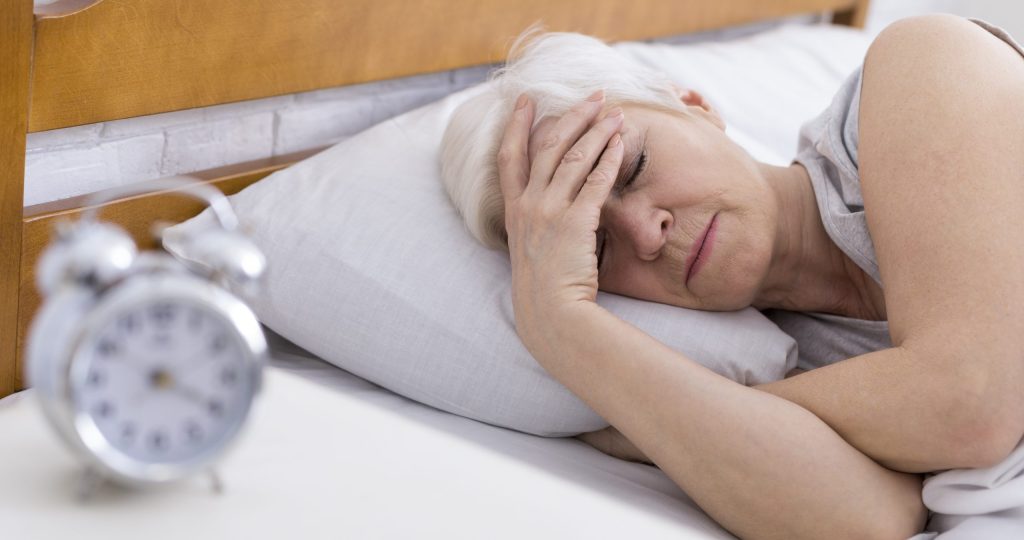Joint pain can make it difficult to fall (and stay) asleep, making it harder for your body to get the reparative rest it needs to function optimally. If you’re experiencing hip pain and difficulty sleeping, it’s important to seek medical advice so you can get the relief you need.
Why does hip pain worsen at night?
Experiencing hip pain at night can be caused by things like pregnancy, poor sleep position, or an unsupportive mattress. However, it can also be a symptom of a more serious condition, such as:
- Osteoarthritis: The breakdown of cartilage in the affected joint can allow the bones to rub together, causing pain and stiffness.
- Bursitis: Inflamed bursae (fluid sacs around joints) can cause pain.
- Tendonitis: Inflamed or irritated tendons can cause pain and tenderness in the affected joint.
- Sciatica: Pressure on the sciatic nerve can cause lower back pain that spreads to the hip, buttocks, and leg.
- Sciatic-piriformis syndrome: A piriformis muscle spasm can put pressure on the sciatic nerve, causing numbness, tingling, and pain.
How are hip pain and sciatica related?
Sciatica is a symptom of an issue with your sciatic nerve. The sciatic nerve begins at the lower spine, then splits and travels down each side of the buttocks, hips, and legs. It’s the longest nerve in the body. When there is pressure on this nerve or if any of the nerve roots are irritated, the symptoms can radiate along the sciatic nerve and spread down to the hips.
Sciatica symptoms, which typically occur only on one side, include:
- Pain in your lower back that comes and goes
- Pain in your back, hips, and buttocks
- Weakness in one leg
- Numbness and tingling along the nerve
How are pregnancy and hip pain related?
Hip pain during pregnancy is fairly common. If you experience hip pain while pregnant, speak to your doctor about your symptoms to receive a diagnosis and treatment options. It is usually not a sign that there is a complication with your pregnancy. Some common causes behind hip pain during pregnancy are:
- Weight gain: Gaining weight during pregnancy is normal, but it can put more stress on your joints. A large amount of weight gain may result in hip pain and other types of joint pain.
- Posture: Carrying more weight around your stomach can cause your normal posture to change. Your baby may also prefer to settle on one side of your body, causing more joint pain on that side.
- Sleeping position: Sleep positions can be limited while pregnant due to the size of your belly. Sleeping on your side can cause hip and joint pain, as it puts more pressure on your joints. If you’re a side sleeper, consider putting a pillow between your knees while you sleep for more joint support.
- Hormones: Your body’s production of a hormone called relaxin increases during pregnancy. This hormone relaxes the tissue that connects your bones, which can lead to discomfort in your pelvic area, including your hips.
- Transient osteoporosis: During the second or third trimester, your body’s calcium and potassium levels may change, resulting in the demineralization of your hip bones. While this condition can cause hip pain, it typically resolves after the baby is delivered.
What advice do you have for someone whose hip pain is preventing them from getting a good night’s sleep?
If your hip pain is keeping you up at night and interfering with your daily activities, speak to your doctor to begin a diagnosis and treatment plan. Your doctor may prescribe an OTC pain reliever or arthritis medication. In some cases, such as pain caused by osteoarthritis, surgical intervention may be recommended.
Some simple ways to manage hip pain at night include:
- Icing or heating the area (speak to your doctor to find out which is best for your condition)
- Changing your sleeping position
- Sleeping with a wedge pillow under your hip
- Sleeping with a pillow between your knees
- Getting regular massages
- Changing your mattress or using a new foam mattress pad
- Exercising regularly (low-impact exercises, such as swimming, water aerobics, walking, and yoga)
- Stretching and walking throughout the day (avoid sitting for long periods)
- Practicing good sleep hygiene to promote relaxation (going to bed at the same time every day, taking a warm bath before bed, avoiding electronics before bed, and ensuring your room is quiet and dark)
When should I see a doctor for hip pain?
While slight aches and pains may be a normal part of getting older, pain that interferes with your daily life and sleep patterns isn’t. If you’re experiencing chronic hip pain, it’s important to reach out to a medical professional. If your hip pain is a symptom of a more serious condition, you may need early intervention such as hip replacement surgery or another type of hip surgery to help prevent complications.
With private clinics in Canada, Surgical Solutions offers private hip surgery and hip replacement surgery without long wait times. Read our related blog post to learn how to prepare for your procedure.
Experiencing hip pain?
Learn more about private hip surgery and hip replacement surgery from Surgical Solutions Network. Receive rapid access to private surgery in Canada at our private clinics in Toronto, Winnipeg, Calgary, and Vancouver. Contact us today to arrange a consultation.
We are a leader of private healthcare in Canada providing rapid access to surgery without long wait times. Surgical Solutions Network offers Canadians high-quality healthcare from our team of fellowship-trained surgeons and registered nurses at our advanced surgical centres. Learn more about our licensed surgical centres across Canada.
